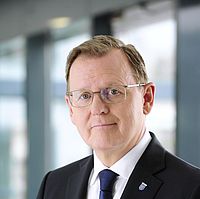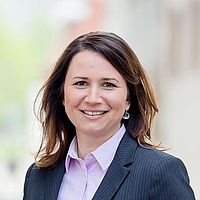Thuringia
“ Thanks to its atypical position as an energy transit region without major power plants and with high electricity imports, Thuringia is particularly suited for testing increased flexibility in energy demand, smart grids and the integration of energy storage solutions. Our hope is for the showcase project to promote innovative technology applications and test out new and promising business models.”
Bodo Ramelow, Minister-President of the Free State of Thuringia
Foto: TSK
Energy Transition In Thuringia
Thuringia is committed to an energy transition that is decentralized, regional and renewable. This approach highlights an ambitious goal: By 2040, Thuringia wants to cover its entire energy demand by a mix of renewable energies from own sources. This means that over the course of a year, the total domestic demand for energy is matched with the total generation of renewable energy within the state. This requires an expansion of renewable energy, increased energy efficiency, energy conservation and measures for sector coupling. The supply of energy must play a decisive role in achieving climate goals. However, it cannot exclusively be compatible with environmental and climate goals, but it has to be secure and affordable as well. Only then will it make the necessary contribution to prosperity and economic development. These central energy policy goals are also reflected in the Thuringian Climate Act, which entered into force at the end of 2018. This act lays out the framework for Thuringia’s energy and climate policy, sets down guidelines and ensures a binding commitment.
With an intelligent energy and climate policy, the state government wishes to ensure that Thuringia is well positioned for the future and comes out of the transformation process stronger than before. The energy transition creates opportunity for innovation, value creation, competitive jobs and greater participation. The Thuringian state government makes use of its freedom to act by establishing a wide range of offerings for the diverse parties involved. For example, it promotes energy efficiency measures in companies, charging infrastructure for electric vehicles, landlord-to-tenant electricity supply models and demonstrator projects. The state government aims to make the benefits of the energy transition available to as many participants as possible. This strengthens resolve and acceptance.
The transformation of the energy system is a complex and dynamic process. Current challenges are the integration of renewable energy into the market, increasing the flexibility of energy supply and demand, intelligent coupling of the sectors of electricity, heat, transportation and industry as well as a fair distribution of the financial burdens. To overcome these challenges, innovative and practical solutions are required that can prove themselves on the market and garner acceptance. WindNODE can make an important contribution here. It is to be hoped that further projects will develop out of WindNODE and that WindNODE will give the energy transition an additional boost.
“ Thuringia is committed to a decentralized, regional and renewable energy supply. Our key energy policy goals issue great challenges and offer numerous opportunities. The transformation of the energy system demands innovation, networking and information. WindNODE has the potential to act as an important driver and help move the energy transition forward.”
Anja Siegesmund, Minister for Environment, Energy and Natural Conservation of the Free State of Thuringia
Foto: www.photograph-erfurt.de

